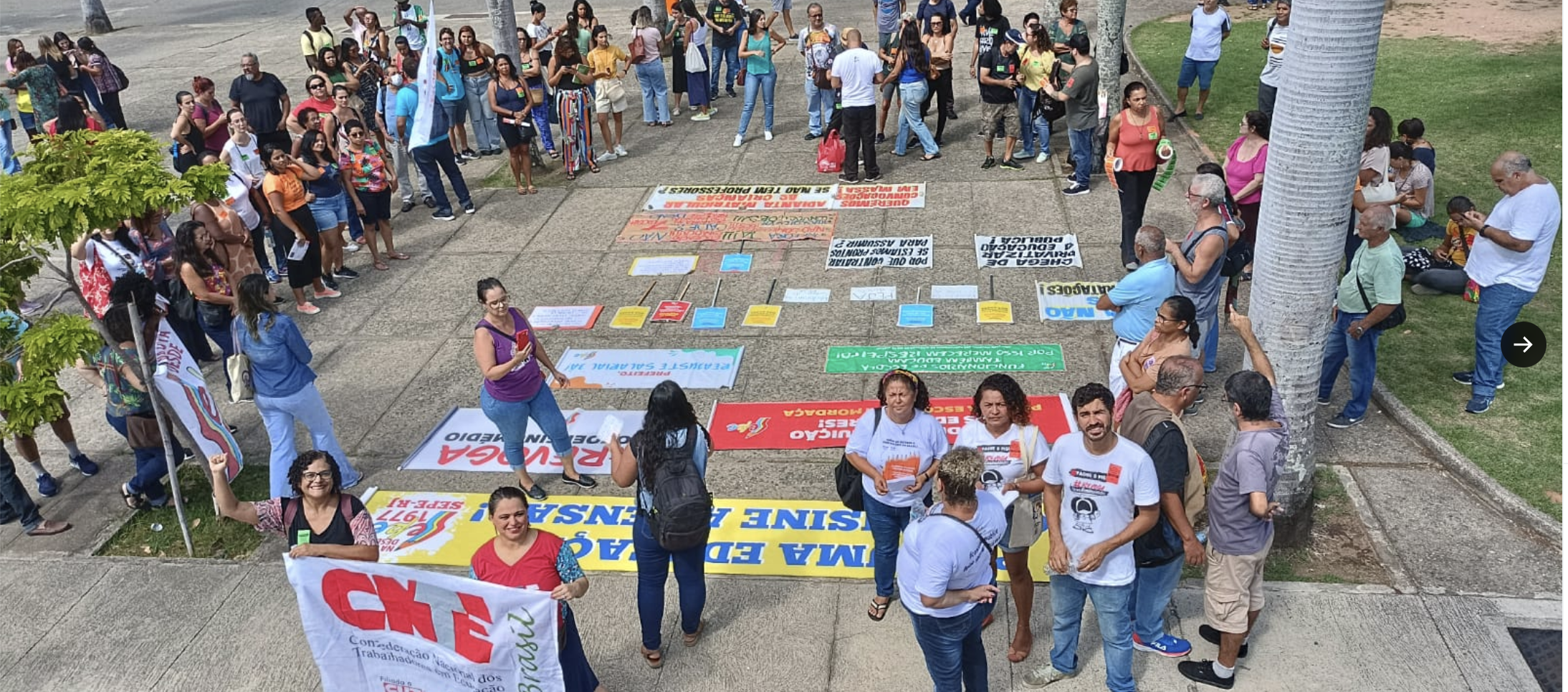By Rodrigo Dutra & Mike Elk
RIO DE JANEIRO, BRASIL – On Wednesday, in Rio de Janeiro, thousands of educators, members of the National Education Workers Alliance (CNTE), went on strike as part of a nationwide strike that mobilized over 150,000 educators and school employees from various unions throughout the country.
In Rio de Janeiro, hundreds of teachers and school support employees gathered on the steps of Rio City Hall with signs and banners reading “Stop Paying Us the Lowest Salary in Brazil.” Others carried signs that read, “Claudio Castro Pay Us the Minimum Wage!” denouncing Claudio Castro, the Bolsonaro-aligned governor of the state of Rio de Janeiro.
The teachers were demanding answers from Rio de Janeiro Mayor Eduardo Paes, a centrist Lula supporter, and Rio de Janeiro State Governor Claudio Castro, a Bolsonaro ally, about why both their administrations have failed to implement a wage increase promised to them by federal law more than 14 years.
The teachers and school support staff also demanded repealing the draconian education reform known as ‘New High School.’ The unpopular measure was passed by Michel Temer, the neoliberal President of Brazil, who was installed by a coalition of Bolsonaro allies and centrist business interests in 2017 after Lula’s successor Dilma was removed from office in a move widely considered a “coup” by many international observers.
The 24-hour strike mobilized 150,000 workers and students in all of Brazil’s 27 states. Wednesday’s strike is part of a growing series of strikes by educators in Brazil.
On March 15th and March 22nd, educators and school employees went on strike in 51 cities, demanding change. Now, as educators went on strike again this past Wednesday, they are discussing escalating these strikes even more unless the government responds to their demands. Some teachers are even denouncing their union leaders and demanding more independence from top-down union federations that they say are too close to some of the governing powers in Brazil.
After years of working in poverty, public educators in Brazil are demanding the implementation of the National Education Plan (PNE) law passed by the Lula Administration in 2008 during his second term. The law stipulated that the average salary for teachers should be equal to that of other professionals with the same education level. However, educators are still paid 70% lower compared to other careers.
Brazilian educators and school employees are asking for a 14.94% wage raise to 20 Brazilian reals an hour (the American equivalent of $ 5 an hour). They also are demanding that more part-time teachers be converted to full-time status.
One teacher named Rosa, interviewed by Payday Report, said that at the beginning of her career as a public school teacher in Rio that she worked in 3 schools to get the workload necessary to pay her bills.
“Not to mention the unpaid hours that I grade and plan tests during my weekends,” said Rosa.
With Lula defeating Bolsonaro in October, many trade unionists are pushing local and state governments, many still governed by Bolsonaro allies, to implement long-ignored laws meant to help workers.
Despite being legally guaranteed since 2008, many states and municipalities throughout Brazil have yet to implement the law.
“There is an insistence of governors and mayors in not complying with the law and still seeking all sorts of tricks to make this achievement of the teachers unviable, which we want to be extended to all education workers, because schools don’t live on teachers alone, there are also lunch ladies, servants, and administration employees who need and should be valued,” said CTNE secretary Roberto Leáo.
Both state and local governments have repeatedly claimed that it would meet the teachers’ demands but have yet to take action to implement the law. However, workers say that they have had enough of the false promises.
On Monday, May 1st, Rio de Janeiro Mayor Eduardo Paes is holding a celebration for International Workers Day. While some unions, like the 7.5 million member CUT union federation, are participating in the event, educators like 35-year-old Mariana say their union SEPE should not participate.
“We as a union must exercise union independence, and we cannot join the government to have a celebration about worker,” says Mariana.
Rank-and-file educators in Brazil say that it’s crucial that in a new era of possibilities during this new Lula era that, they push for more from local and state governments.
“We cannot align ourselves with Eduardo Paes and Claudio Castro,” says Izabel Costa, one of the directors of SEPE.” They showed themselves against our class when they constantly deny our rights, when they refuse to dialogue with us.”
A carioca native of Rio de Janeiro, Rodrigo Dutra is the Rio de Janeiro Bureau Chief of Payday Report and an editor of Portas Favelas. A yinzer native and resident of Pittsburgh, Mike Elk is the Emmy nominated Founder of Payday Report and studied journalism at PUC-Rio de Janeiro.


